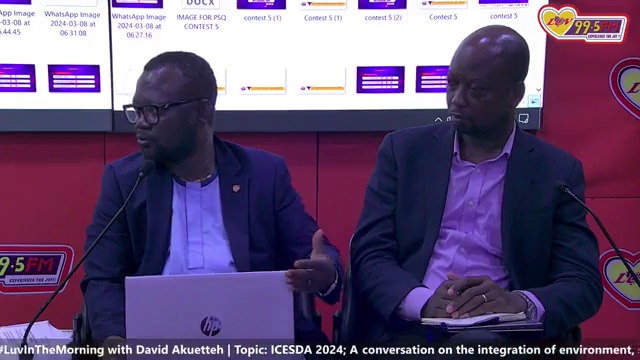Executive Director for the Centre for Business Incubation, Dr Christian Sewordor Mensah, has observed a low enthusiasm in Ghana’s quest to militate against actions that degrade the environment, bringing about a climate crisis.
According to him, the country’s failure to take drastic measures to achieve the 17 Sustainable Development Goals by 2030 could plunge the economy into food insecurity.
Speaking on Luv FM, Dr Mensah emphasised that collective focus and consideration are needed to take proactive measures for environmental progress.
"If we don't take bold and intentional steps to confront the issues that have been identified and categorised as global challenges, we will soon find ourselves without any food to eat due to the adverse effects of the environment," he said.
He observed environmental challenges, such as illegal mining and destruction of wetlands, pose threats to human existence.
“The society could be drained and ultimately face extinction and encounter challenges that can't be quickly resolved, potentially leading to our demise,” he said.
Dr Mensah made the submission ahead of a three-day international conference that would gather stakeholders in academia and industry to delve into pressing matters about the environment and sustainable development in Africa.
The event dubbed ICESDA2024 is on the theme, “Enhancing Environment, Social, Governance and Sustainability for Africa’s Development.”
The maiden edition would see deliberations and recommended solutions to address environmental and climate challenges in Ghana and on the African continent.
Professor De-graft Owusu Manu of the KNUST says the country's attitude and perception in finding pragmatic solutions to tackle environment and climate destruction are not good enough.
“The recent Akosombo water spillage and the illegal mining menace is affecting us badly. We need solutions to solve these problems. If we don’t take action. There’s going to be problems for our future,” he said.
Advocating for a more robust system to fight the climate menace, the Conference Manager for ICESDA2024, Dr Appiah Kenneth, acknowledged that despite the existence of sanitation and environmental laws, their implementations are faced with setbacks.
“There are laws regarding sanitation, but the real issue lies in the enforcement. Enforcing these regulations requires adequate resources because it is not as simple as just implementing laws. We need to provide the necessary resources to empower those responsible for enforcing such laws,” he said.
Latest Stories
-
Rawlings’ values must be our guide – Asiedu Nketia
10 minutes -
Bawumia’s meeting with MMDCEs a political strategy – Kwasi Kwarteng
38 minutes -
Kofi Owusu Peprah reveals why he quit his job as a BNI officer
41 minutes -
No candidate matches Bawumia’s experience and exposure – NPP Communications team member
42 minutes -
220 former MMDCEs endorse Bawumia as 2028 NPP flagbearer
51 minutes -
Iran Israel conflict: Ghanaian businesses lament over rising freight charges
1 hour -
Qatar closes airspace as UK and US tell citizens to shelter in place
1 hour -
NPP flagbeaership: I’m quietly building my support base – Dr. Adutwum
1 hour -
Dr. Adutwum’s bid for NPP flagbearer gains momentum, Railway Market traders declare support
1 hour -
Ghana winger Christopher Bonsu Baah set for big-money move to Saudi Arabia
2 hours -
Police warns public against fake recruitment scam
2 hours -
Bands must be recognised in award schemes – Nkyinkyim Band
2 hours -
Du Bois Museum Foundation marks 40th anniversary of memorial centre for Pan-African culture
3 hours -
Multichoice Ghana announces major discounts on DStv and GOtv
3 hours -
Police in A/R arrest 5 Nigerians, 1 Ghanaian for attack and robbery of bank customers
3 hours

